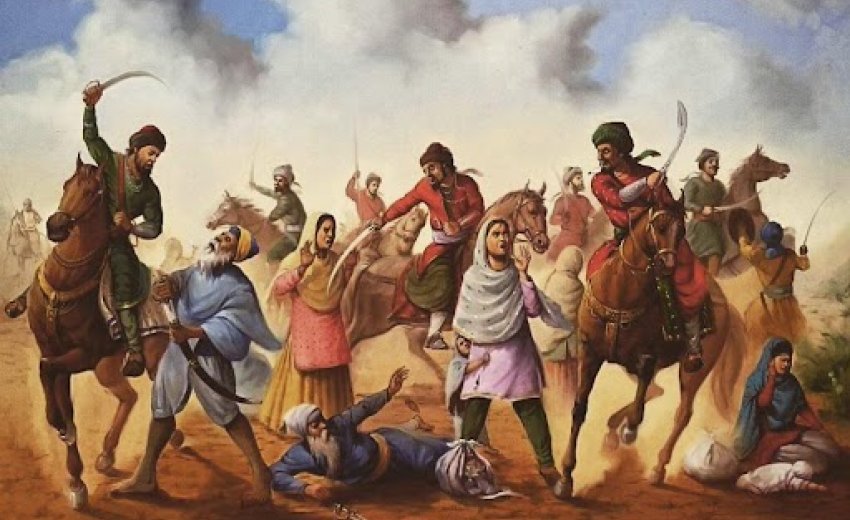250 years ago, near Malerkotla at Kup-Rohira, thousands of Sikhs lost their lives in just two days on February 5 and 6, 1762. This dark chapter, known as the Vadda Ghallughara or great holocaust, was a consequence of Sikhs seizing valuables from the Afghan invader Ahmed Shah Abdali's forces. The tension escalated, especially after the Sikhs looted Abdali's troops following his fourth invasion in 1757.
Abdali's aggression extended to the sacred Harmandar Sahib (Golden Temple), a revered place for Sikhs. Shockingly, foreign invaders desecrated the holy pond by filling it with slaughtered cows. This brutal act fueled deep resentment among the Sikh community towards Abdali. The events of those days left a lasting impact, marking a tragic episode in Sikh history and fostering a sense of hatred towards the Afghan invader.
The battle in 1761
During the clash between the Marathas and Abdali in January 1761, the Sikh bands boldly seized significant loot from the Afghan forces, enraged Abdali. The Sikhs, known for incessantly resisting Afghan invaders and depleting their resources, became a specific target in Abdali's sixth invasion in 1762.
This was because, after winning the Panipat battle, on his way back, Sikhs had attacked and harassed Abdali's forces a lot, all the way from the Satluj to the Indus. Abdali was so mad that he ordered the killing of over 25,000 Sikhs and their families in just two days. The massacres started at Kup-Rohira and ended at Gehal as Abdali's forces passed through the village Kutba. It was a very sad and violent time for the Sikhs.
Historians disagree on the number of Sikhs killed in a tragic event known as the Vadda Ghallughara. According to historian N K Sinha , 25,000 Sikhs lost their lives.Historian H R Gupta suggests 12,000, and Sikh scholar Rattan Singh claims the toll was 30,000. This horrifying event marked a turning point for Sikhs as they faced foreign invaders. Facing a surprise attack by Abdali's forces, Sikhs bravely shielded women, the elderly, and children, gearing up for a battle to protect their loved ones. Despite their efforts, Abdali managed to break through their defenses, leading to a devastating massacre. This event fueled a strong resistance from Sikhs against the foreign invaders.
After the Sikhs faced violence, they retaliated by killing Zain Khan, the governor of Sirhind. They did this because he aligned with Abdali's forces and fought against the Sikhs even before Abdali reached Kup on February 5, which was earlier than the Sikhs had expected based on historical records. The Sikhs thought Abdali's soldiers would come near Malerkotla by February 7.
Abdali, the marauder, launched another attack against the Sikhs, starting from Afghanistan in October 1764 and reaching Amritsar on December 1, 1764. Sikhs like Jassa Singh Ahluwalia, Jassa Singh Ramgarhia, Charat Singh Sukarchakia (Maharaja Ranjit Singh's grandfather), Jhanda Singh Bhangi, and Jai Singh Kanhaiya relentlessly pursued Abdali's forces, frequently raiding the imperial caravan. Abdali, frustrated by these attacks, lost a significant amount of his loot to the Sikhs.
Historian H R Gupta in his book, "A history of the Sikhs," writes "Nothing could surpass the daring, the dogged tenacity and invincible fortitude of the Sikhs who held themselves with their exposed flanks and open rear."
Memorial marking the battle
A memorial is being built in Rohira to honor the brave martyrs of Vadda Ghallughara. People in the area take pride in their land, which made significant sacrifices to keep foreign invaders away. Darshan Singh from Kup mentioned, "Our land has a rich history of valiant struggles by the Sikhs, and it's great that a memorial is coming up to remind future generations about it."
In 2009, Punjab Chief Minister Parkash Singh Badal laid the foundation stone for the memorial in Kutba, but it was later shifted to Rohira in 2010 when SAD President Sukhbir Badal laid the stone on October 18. However, the construction of the memorial, spanning 10 acres and costing Rs. 12 crore, is still in progress and not yet completed.
Moreover, the fact that it is coming up at Rohira has not gone down well with the Kutba residents. "We are feeling cheated as our village has been ignored and the memorial is coming up at Rohira despite Badal, SGPC president Avtar Singh Makkar and former president of the Sikh body Bibi Jagir Kaur laying stones at different times at Kutba", rued Nirmal Singh, member, Kutba Ghallughara Yadgari Gurdwara Committee. Mukhtiar Singh, a villager said angrily, "If the memorial was to be built at Rohira, then why did Badal fool people by laying the foundation stone here?"
Holy bir still intact
Over 250 years ago, during a time when the forces of Ahmed Shah Abdali were causing harm to Sikhs, a handwritten copy of the Guru Granth Sahib found its refuge in the Kuthala village's gurdwara. This sacred book, brought to the village by Baba Sudha Singh, has stood the test of time, remaining intact despite the challenges faced.
According to the story, Guru Gobind Singh, the tenth Sikh master, had five copies of the Guru Granth Sahib written at Damdama Sahib. These copies included the writings of the ninth Sikh master, Guru Tegh Bahadur. Guru Gobind Singh entrusted these five copies to different groups of Sikhs for safekeeping. One of these copies was in the possession of Sudha Singh, who led a group of 19 Sikhs.
In a tragic event, Abdali's forces attacked Kup-Rohira, leading to the massacre of thousands of Sikhs, including all 19 members of Sudha Singh's group. Miraculously, Sudha Singh managed to bring the sacred copy to Kuthala village. Since that perilous time, the bir has been safeguarded at the village's gurdwara, becoming a symbol of resilience and devotion.
*Based on an article by Neel Kamal, published in Times of India on 7th February 2012
